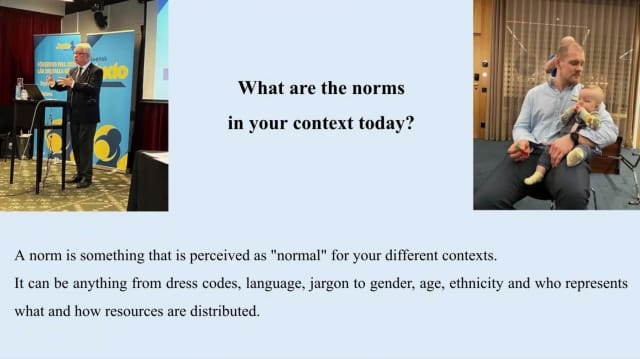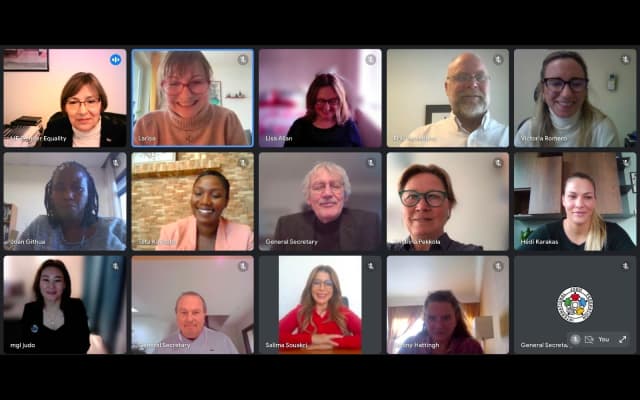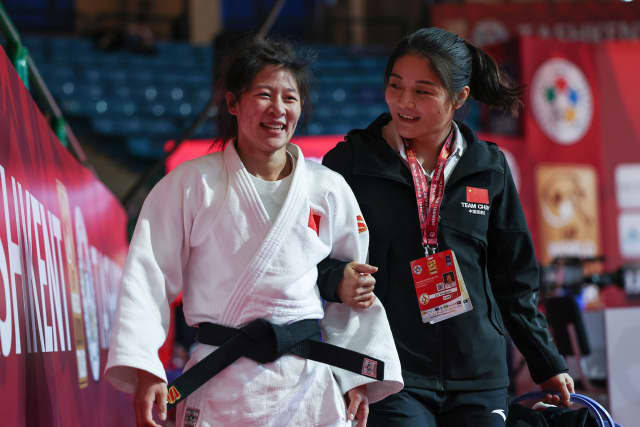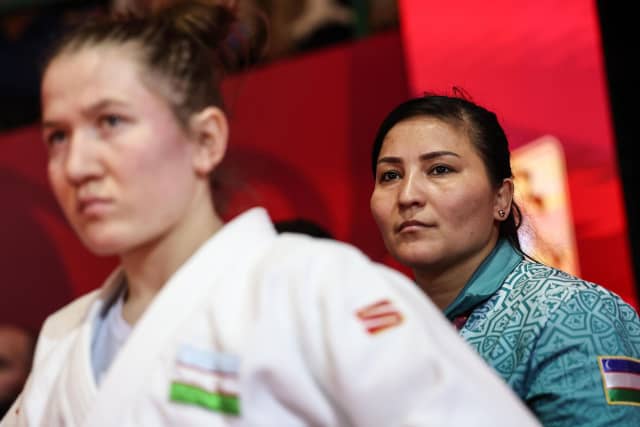Mr Marius Vizer welcomed the participants, "I want to congratulate all of you for your achievements in sport and in your lives, in all your activities. I wish you all the best and be assured that you will always have all my support and that of our organisation."
Sanda Corak said, during the introduction, "It is great to have your support Mr President. The main idea behind these round tables is to get together with as many national federations as possible, to exchange experiences of promoting and developing women's judo in all sectors."
Larisa Kiss, IJF International Relations Manager presented the work undertaken in the judo world in recent years, under the guidance of the IJF. She began by explaining how honoured she felt to be part of a group composed of inspiring people, those who can also inspire a generation of young girls and women towards the future. She then said, "We are in a revolutionary era in the empowerment of women around the world. There is a big focus on women's rights and in the sport world on women coaches but in judo we are working on all aspects of the question.
With regard to athlete quotas, the numbers are looking good. We still have much effort to make in other sectors, while respecting everybody's culture and traditions. We believe we can attract more women to the sport in all countries. I can say that today we see a boom in female empowerment in judo. I think we are now over equity and we are looking at equality. As Jigoro Kano stated, judo is education and education is for all. I am happy when I see that male athletes are happy to share the spotlight with their female counterparts. Promoting women's judo is inspiring and all the women we are working with are also so inspiring."

Dr Sanda Corak underlined these words, "In the IJF we have a clear gender equality strategy that we published and are keen to foster. It offers guidance to all national federations. We all have to start somewhere and that is what we are doing, adapting to local habits. The equal quota and the mixed team events have been very helpful. We know that there is still work to do and we are working on it. We also need to open dialogue with parents to show them that judo is good for our girls. The idea is not for us as women to be there to occupy a position but to be there because we deserve it."
Larisa Kiss added, "We have to make the world believe that we can do it and we have to make women believe that they can be great!"
During the exchange between all participants, Kirstina Pekkola, President of the Swedish Judo Federation, presented on how they profoundly changed their vision in recent years, "We were a dysfunctional family. We needed to find a new way to keep developing judo in our country. For that, we need a new attitude, courage and to know what kind of efforts were needed. We were stagnating in terms of the number of judoka. It was a big challenge. We started to educate our judo community to have more women involved and believe me it is much more fun and creative to have this shared space with women."
Jean-Luc Rougé, IJF General Secretary and member of the Gender Equality Commission underlined, "We need to have tools to control what the federations are doing. It's not enough to have rules. Those tools will help us to monitor the development of women's judo, which is necessary and will also help us reach our development goals. As Larisa said, judo is education and yes, we have to adapt to every situation, but what the IJF and the commission have been doing for many years is great."
The interest of such round tables is to give the floor to people with different backgrounds. Hedvig Karakas (HUN) is still a top athlete and a member of the IJF Athletes' Commission. She raised the challenge she is facing, "I am still a professional judoka but I am close to taking a big decision concerning my career and my life. I've spend the last 23 years in judo and I feel that I don't know enough about my opportunities and options. We should have more information for professional athletes who want to stay close to the sport. I am now in the phase of thinking about what to do next? Who am I if I'm not a professional athlete?"
Those are the important questions athletes are asking themselves, questions that can be even more important for female athletes and that were discussed by all the participants of this very first round table. Today was not only about celebrating International Women's Day, it was also for talking about where we are coming from, where we are and where we want to go. What is sure is that women have a more prominant role to play in judo and they have to have courage, as stated by Jean-Luc Rougé, to reach those roles. It will help everyone at all levels and help judo to grow, offering equitable and equal chances for all.



